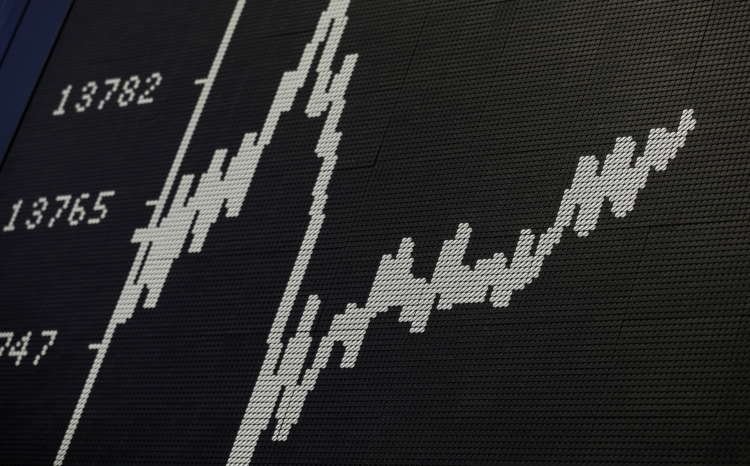Stocks struggle as tech slide erases commodities surge
Published by linker 5
Posted on February 23, 2021
3 min readLast updated: January 21, 2026

Published by linker 5
Posted on February 23, 2021
3 min readLast updated: January 21, 2026

By Danilo Masoni
MILAN (Reuters) – World shares struggled on Tuesday as a rally in commodity-related assets gave in to pressure on heavily weighed tech stocks and investors awaited reassurance from U.S. Federal Reserve Chair Jerome Powell on the path for monetary policy in United States.
European tech stocks were on set for their worst day in four months, down 2.7%, and futures on the Nasdaq fell 1.5% after losses in stocks like Apple and Tesla dragged the index down 2.5% on Monday.
“The prospect of a less dovish tone from central banks, sparked by rising inflation, is causing stock traders to reduce their exposure to equities, especially overbought sectors like tech,” said Pierre Veyret, analyst at ActivTrades in London.
The MSCI world equity benchmark fell 0.1% to fresh two-week lows by 1138 GMT, having earlier risen on gains in commodity-heavy equity indexes in Asia. S&P 500 futures also fell, and were last down 0.5%.
Tesla shares were set to plunge into the red for the year, hit by a fall of bitcoin, in which the electric carmaker recently invested $1.5 billion.
The level of angst was also reflected in equity volatility gauges which rose to multi-week highs, while on bond markets German and U.S. yields moved in different directions, even though both remained just below the highs hit on Monday.
After being knocked off from eight-month high by European Central Bank chief Christine Lagarde signalling discomfort with the recent surge in yields, 10-year Bund yields resumed their upward trend and were last at -0.297%.
Ten-year Treasury yields were steady below Monday’s one-year high of 1.394% and were last at 1.370%.
Fed Chair Powell is expected to be equally reassuring on the central bank’s dovish stance when he gives his congressional testimony at 1500 GMT in Washington.
“If there were already any expectations that Powell could try to calm down rates, then (Lagarde’s remarks) have just further cemented them,” said Giuseppe Sersale, strategist and fund manager at Anthilia in Milan.
Commodity prices strengthened again.
Oil prices jumped by more than $1 at one point, underpinned by optimism over COVID-19 vaccine rollouts and lower output as U.S. supplies were slow to return after a deep freeze in Texas shut in crude production last week.
Brent crude was last up 0.7% at $65.7 a barrel after earlier hitting a fresh 13-month high of $66.79, while U.S. crude rose 0.8% to $62.17 a barrel.
“Oil has been caught up in the broader commodities move higher, with a weaker USD proving constructive for the complex,” ING strategists led by Warren Patterson said in a note.
“Meanwhile, there is also a growing view that the oil market is looking increasingly tight over the remainder of the year”.
Copper prices meanwhile hit a 9-1/2-year high as tight supply and solid demand from top consumer China boosted sentiment.
In currency markets, the dollar briefly dropped to its lowest since Jan. 13 ahead of Powell’s testimony, while commodity-linked currencies hovered near multi-year highs.
The dollar index was up 0.1% at 90.137, with the euro flat at $1.215.
Bitcoin fell as much as 17%, sparking a sell-off across cryptocurrency markets as investors grew nervous at sky-high valuations.
(Reporting by Danilo Masoni in Milan; additional reporting by Anshuman Daga in Singapore; Editing by Ana Nicolaci da Costa)
Explore more articles in the Trading category











